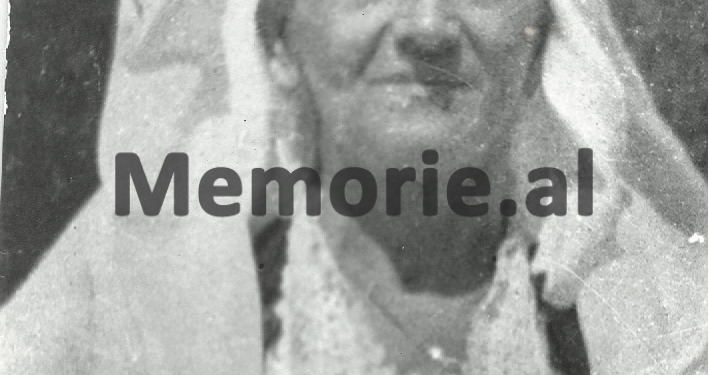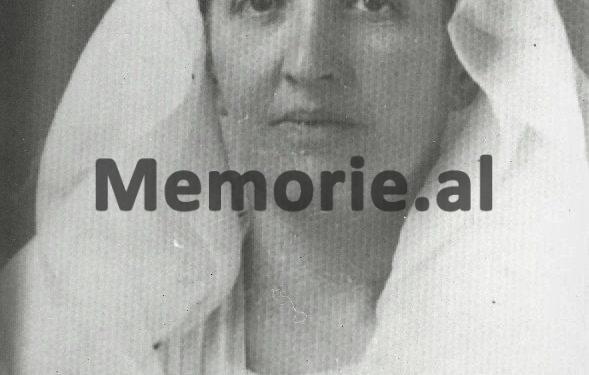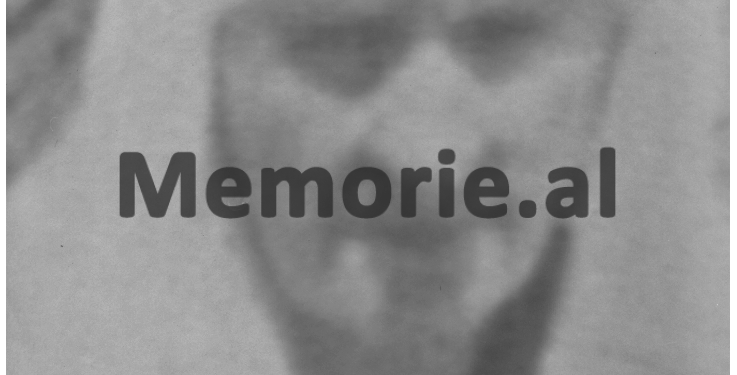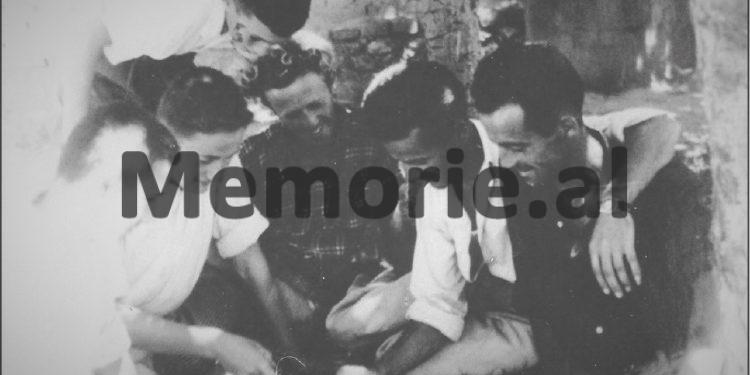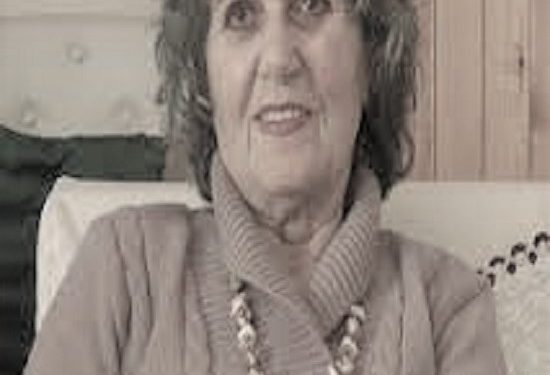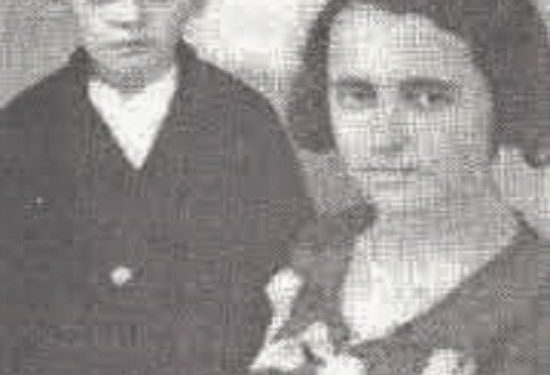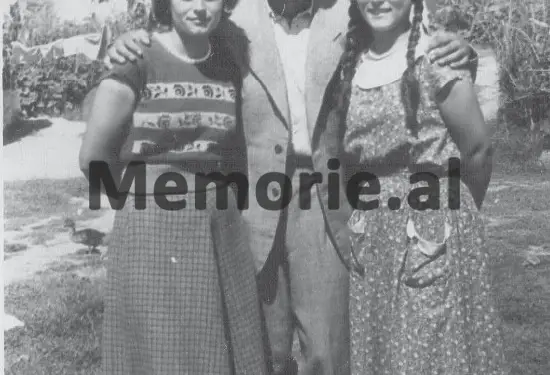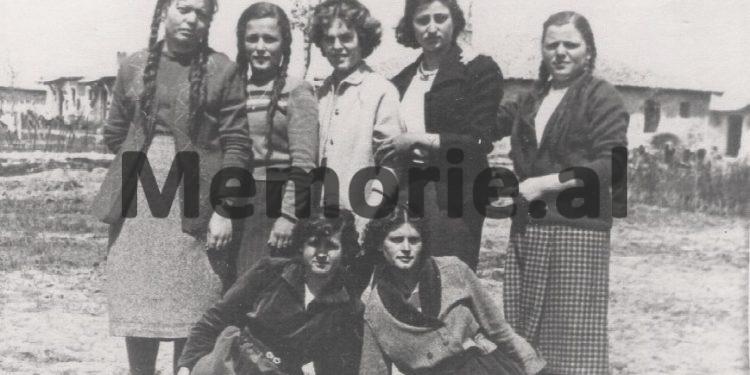Fatbardha Mulleti (Saraçi)
Part nine
Memorie.al publishes some parts from the book ‘Calvary of women in communist prisons’, by Fatbardha Mulleti Saraçi, (granddaughter of the famous former mayor of Tirana, Qazim Mulleti), whose family from 1944 until in 1991, he was persecuted by the communist regime of Enver Hoxha, where Fatbardha’s father, Haki Mulleti, a former senior state administration official since the 1920s, was imprisoned and interned by his family, until died in the hospital of Tirana, poisoned by the State Security. In her book ‘The Calvary of Women in Communist Prisons’, which is the fruit of several years of work, the author has masterfully described the unknown stories of some of the Albanian women and girls who suffered in prisons and internments in the dictatorial regime of Enver Hoxha, started by her mother, Pertefe Mulleti, and in turn: Marie Deda, Hajrie Kazazi, Kushe Seknej, Mrike Pali, Zyliha Rusi, Roza Jakova, Fatime Dilaveri, Hatixhe Pipa, Marije Gjoka, Angjelina Topalli, Hatixhe Kopliku, Nafije Kop Bushati, Budije Bushati, Adile Kazazi, Antonela Dostanishta, Nafije Stërmasi, Luçije Saraçi, Adile Meta, Qeuthere Meta, Feride Damnori, Vitore Ashta, Fetije Vuçiterni, Zehnije Gjylbegu, Xhyhere Kazazi, Luçije Malaj, Leadije Kazazi, Sadije Kazazi Hava Repishti, Luçije Kurti, Rukije Bushati, Shaqe Logoreci, Qamile Myftija, Marie Ndokëllia, Rozë Çefa, Çile Staku, Shaqe Marku, Lajde Arapi, Lutfije Barbullushi, Syme Muka, Zenepe Kraja, Fahrije Kazazi, Naxhije Plari, , Lizë Vukeli, Bade Kjaraj, Hava Baçi, Xhehadire Boriçi, Vitore Kalaj, Katerina Benusi, Sofije Baja, Lenë Pjetri, Dava Markagjoni, Mrika Markagjoni, Marta Gjonmarkaj, Bardha Gjon Markagjoni, Kristina Gjomarkaj, Çelestina Pervizarki, Kune Miraka, Sultana Dine, Vera Dine, Agime Dine, Hamide Çela, Vera Dine, Kadrije Cami, Sanije Sulaj, Meliha Sulaj, Vashe Kola, Prena Llesh Gjeçi, Gjystina Seku, Ilda Melgusha, Agime Pipa (Aranitasi), Terezina Pali, Liza Pali, Adile Boletini, Nasibe Kazazi, Ana Daja, Dila Zef Ndoja, Zyraka Mano, Shanisha Dosti, Zojë Gjeloshi, Drane Stakja, Elena Luli, Sabiha Kasimati, Marije Deda, Marije Shllaku, Biçe Pistulli, Sadije Kazazi, Gjyzepina Çoba, Marta Doda , Frida Satedini, Vitore Kuka, Gjela Llesh Biba, Bardha Cub Marku, Liza Llesh Mali, Bardha Mark Bushkola, Marije Tuci, Olimbi Baruti, Angje Kovaçi, Bedrije Ashikja, Musine Kokalari, Motër Gjeorgjina, Liljana Radovani, Laura Keqi, M Mrike Zadeja, Angjelina Shantoja, Naime Koçi, Sheriar Sefa, Vitore Shllaku, Liza Gjon Voci, Nina Shiroka, Laje Mehmeti (RRema), Feride Beshiri (Quku), Hasije Ulqinaku (Quku), Sofije Kali, Çile Gjush Larja, Nurfezo Koprencka, Sanije Gjylbegu, Emilja Shest Bregu, Vida Radovani, Nedrete Pipa, Motrat e Osman Kazazi, Safete Jusif Sokoli, Çiljeta Simoni, Lutfije Buashati, Sadije Bushati, Olga Schëeizer Libohova, Evelina e Ndoc Naraçi, Geraldina Apony-Zogu, Hilda Zyma. Marie Rafael, Zade Muka, Rukije Bushati, Hajrie Vrioni, Emine Gjyrezi, Xhemile Beqir Komi, Hedije Dume Repishti, Syme Muka, Fetije Vuçiterni, Sebije Puka, Marjeta Serreqi, Dhurata Sokoli, Klara Miraka (Merlika), Asi , Liri Cenaj, Rudina Dema, Adelajde Miraka, Drane Jakja, Syriha Hasi, Aishe Gogaj, Luçija Kaçaj, Gjyljana Malaj (Pervizi), Nadide Kasaruho, Nadire Kërçiku (Peshkëpia), Shpresa Ballolli (Merdani), Makbule Frashëri, Misly Çrash Dervishi (Leka), Natali Arkandi Rozengolc (Pengili), Vigelmina Vitalij Kovaleshko (Veshi), Rukije Rama, Tefta Tasi, Liri Lubonja, Kozara Kati, Shpresa Ngjela, Vera Bekteshi, etc.
Continued from the previous issue
January Staku
(1893 – 1964)
She was the sister of the well-known trade unionist Shtjefën Ingrizit. He was the one who educated his sister in a democratic, anti-dictatorial spirit. He showed this especially during the war, as well as after it. During the Italian fascist occupation, her house became one of the main bases where nationalists gathered, grouped around the organization of the ‘National Front’. Her only son, Zefi, was one of her exponents. In conditions of secrecy, as well as great danger, she was found next to her son, in patriotic activity. When work required her, she was also the housekeeper. Even today, those who survived remember the “coffee with nuts” – her specialty, with which she entertained her son’s friends, who often whitewashed there, printed tracts, which were then distributed everywhere, and called on the people to anti-fascist and anti-communist resistance. One of the witness’s recalls how in the technical room of this organization, the paint of the typographer was poured. “Çilja himself came and cleaned it; you worked for us at night. Then he said: “I do not trust to put anyone else here to clean it.” There are episodes of this nature for this energetic woman who gave her contribution in the fight for liberation…
It was the morning of July 26, 1943. The night before (July 25), the radios had announced the fall of fascist dictator Benito Mussolini. At that time, the whole city filled with quotes as well as his portrait. Such fascists had also stamped on the facade of her house, which was on the main street of the city. As soon as the day of July 26 dawned, Nana Çile, without telling anyone what, took the ladder, a bucket of lime juice and a brush and dressed it with pants, a 60-year-old woman, at the top of the ladder you might even sing lightly, any old song, first deleted in the city of Shkodra, images reminiscent of the fascist dictatorship. There were strong reasons. Her son had been arrested three times by fascism, and she did not pray to them. As a counterweight, he probably opened the door to the two-door house, for the boy’s friends. He once complained that in one of the searches of the house by the police station, a police officer (known in Shkodra as “dygeçi”) was more diligent than the others and had overturned the house to find compromising items. It was later learned that he was an agent of the communists, they put them in the police station, to do the work of his own party, and of course its task was to fight against the nationalists.
This mother suffered the most with the coming to power of the communists. Twice the boy was arrested and tried in the prisons of the new dictatorship. Twice his anxious parents waited with a frozen heart, news of him. “Are they torturing him a lot?” “Do not sentence him to death”? (That it was fashionable that the communist courts were not spared with this kind of punishment)…
For the 11 years that his son lived in prison, they lived by the lawful marac: “What are they doing to the boy”, “Will the boy be alive?” For 11 years, those two elders would sacrifice so much to provide their only son with complementary food, because the one they gave to the prisoners was known. Mother Çilja also had the help of her sister, Isidora, who, as a young woman, followed her nephew to the camps of Maliq, Orman-Pojan, Beden, or the Shkodra prison.
In this way, they faced the persecution, which in various forms, was done to this good patriotic citizen family and who gave so much for the establishment of democracy in Albania.
Shaqe Marku
(1897- 1981)
Born in Shiroka to a patriotic family, he was raised in Cetina, Montenegro, where he married Lec Marku, the son of the hero of the Rrazhnica War, Shaqe Marku, and would devote himself to his children, the spiritual world so the rich, the generations to go. Meanwhile, the family had settled in Shkodra.
He had enough to show. It was enough to show how Marka Kola, that is, her father-in-law, who was mortally wounded at the bridge of Rrazhnica in 1880, had inserted with her hands in the abdomen, the intestines that had come out of the wound and were taken. It is not in vain that Gjergj Fishta dedicated a song of “Lahuta e Malcis” to this act. Her son, Toma, was involved from the beginning in the ranks of the ‘National Front’ organization. Tue nurtured her children the courage and determination to work and fight for the national cause, Nanë Shaqja, not only was an ardent educator of Albanian nationalism, but also engaged in the clandestine activities of that organization. He took the tracts from the main base, where they were printed and sent them to Dom Zef Shestani, parish priest of the church of St. Kolli, in the neighborhood “Little Rus” and at the same time one of the leaders of “Balli” in Shkodra. Not only that. She herself distributed leaflets to the people, as well as the magazine “Robni o liri”, of this organization. In 1944, she prepares her son and his comrades, who were going out in the gang, clothes with insignia. That same year, her daughters would embroider a large national flag, which would be presented to the President of the ‘National Front’ of Albania, Mithat Frashëri, during his visit to Shkodra. Only she and her son would know where the weapons, tracts and everything else that were desperately wanted by the Security were hidden.
With the arrival of the communists in power, difficult times came for Lec Markut’s family. In late December 1946, Toma is arrested. She is shown to be a real man, to cope with the situation. Cleverly hid his son’s compromising materials. Remembering this, your son, in prison, would dedicate a poem to him, ending with the verses:
“When you miss, mother’s heart to fill it,
For your son, who died in prison?
With your hand, you unfurl the flag,
Kiss me, because I owe it to my homeland “.
He constantly follows her to prison, bringing her food and clothing. How hard it was to find them then! Do not hesitate to sell household clothes. It was not uncommon for her, after handing over the meager food to her son, to come out and be held by the guards because she fainted from despair.
The boy is finally released from prison … half dead. After that, for 20 years – in hospitals (a life of ours). And she’s back to the top. How can only mothers stay?
He died in old age, 84 years old, poor, but proud that he never succumbed to the communist regime and troubles.
Lajde Arapi
(1893 – 1963)
“O my son, O young boy
That you sacrificed for Albania
For Albania, my mother grew up!
Don’t look like anyone in the captaincy. ”
These are some of the verses dedicated to the martyr Zef Harapi, killed in 1912. Perhaps this poem was the first that Mother Lajdja taught her orphaned children, as if she wanted to teach them, to stick to their martyred uncle. . These patriotic feelings would embrace everyone. The son, Carlo, would stop his studies in Italy, in order to dedicate himself to the national cause; they gave him a great contribution in the direction of the organization of the ‘National Front’. With a nationalist conviction, there was also the other son, Simon, a conviction that the communist regime punished more severely than anywhere else. This was the reason why the first was forced to leave his family and take the winding roads to work for Albania there, while the second suffered imprisonment, because, after graduating from the Fultz American School, he “had to” be a spy theirs. Thus, Mother Lajdja had raised two “enemies”.
A heavy weight fell on her shoulders, which not everyone tried: the house had to be locked, the boy had to be fed in prison. With eyes on the door, lest he receive any good news. With the boys in mind: Was the boy alive in exile? Was the boy in prison in good health? With the tip of the needle, because she was a seamstress, she endured life. With work he suppressed boredom. With work he tried to be forgotten. In 1958, she lost hope that she could embrace her son Carlo once. He died under suspicious circumstances. Was it the hand of Security? And she could not wait for consolation, because her son had not died, but the “enemy” of Albania … The occasional consolation was forced to wait for her secretly. Terrible! Not to be allowed to put the horse in his house, to be forced not to show his great grief, which had accumulated deep in his soul, since 1944. It was 14 years of hope, but also sadness, grief, anxiety. Then 5 more for the other boy in jail. And now, in the end, to isolate him, to self-censor…! He constantly remembered the poet’s verse:
“For Albania, your mother grew up
For this and that I have as a religion
I have a homeland above religion
I have a Homeland “.
He now taught those verses to his grandchildren. And these grew like flowers that his son cultivated in the parks of Shkodra…! Even the love for flowers, she herself had nurtured her son, since he was very young.
Mother Lajdja, remained strong and unyielding in her family vote, which always kept her warm. For family and friends, who still remember him with special reverence, and as the people rightly say: “What is remembered never dies.”
Lutfije Barbullushi
(1893 – 1973)
Bad luck did not spare her, she was 30 years old when her husband died, and they left her with 5 children, the eldest 10 years old. Too early to be both man and woman. How much he needed to raise and educate them.
She passed on the nationalist upbringing, with which she had nurtured herself since she was a child, which she had found in her husband’s family, to her children; All of you. With the difficulties of life, which he faced quickly, he became stronger and became an example for his children and friends.
Her house, which early became the base for the gathering of nationalists, whose country was in pain, when they saw that the foreigner was sitting cross-legged. The boys demonstrated in the streets of Shkodra, the girls cut, sewed and embroidered national flags; she hugged them when the militia asked her, especially Sami, the boy. He would later be sought by the communists, who did not forgive him for the confrontations they had with him during the war over the national question. They asked him not only to break it, but also to know who his friends of the idea were. For two years in a row, the desolate mother would wait at the door of the investigation to learn something about the boy. For two years, she and the girls would wash his shirts, which had blood stains; they would patch them, because they were torn from torture. Then, after he was released, they fed him like a child, as he had come out of there like a corpse, which was already breathing.
The girls did not have better luck either. One, Nuria, melted down to keep her brother-in-law, a well-known nationalist, an important exponent of the ‘National Front’: first they hid them and then in prison. The other, Symja, was interned with her 5 children, in Berat (1945-1946), to continue with the care she received for her husband, prisons. Not a few, but 20 years: reunited in 1965.
These worries, of course, were reflected in Mother Lutfija. But she was already able to cope. With her courage, she taught the girls to be faithful to their husbands and to make their lives easier by all means. The grandchildren, who grew up in her lap, were constantly given advice, to learn as much as possible, to be honest, to be hardworking, to be righteous, religious, etc., like grandparents, as parents.
Her effort was not in vain. They became like that. As she had taught them with patience and dedication for decades, she, their unforgettable mother and grandmother. Memorie.al





